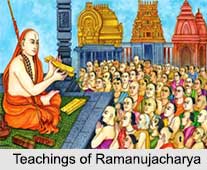 Teachings of Ramanujacharya blend philosophical discussions along with devotional worship. His teachings bring together the intellectuals and the simple religious matters. Ramanujacharya had the responsibility of carrying spiritual teachings of the Vaishnava teacher Yamunacharya though the disciple did not meet the Guru. He achieved the purpose during his lifetime. He sought Guru Goshtipurna and got initiated in the Narayana Mantra (Ashtakshara) that grant salvation. He was so compassionate towards mankind that he taught this to all despite the Guru warning him to keep it a secret.
Teachings of Ramanujacharya blend philosophical discussions along with devotional worship. His teachings bring together the intellectuals and the simple religious matters. Ramanujacharya had the responsibility of carrying spiritual teachings of the Vaishnava teacher Yamunacharya though the disciple did not meet the Guru. He achieved the purpose during his lifetime. He sought Guru Goshtipurna and got initiated in the Narayana Mantra (Ashtakshara) that grant salvation. He was so compassionate towards mankind that he taught this to all despite the Guru warning him to keep it a secret.
Concept of Jiva
The force of Ramanujacharya"s teaching is to submit oneself to God and give up apprehension. He taught people that their present situation is due to past Karma. This would go away and the future can be shaped by a life sticking to Dharma. One should avoid the company of the worldly people. Ramanujacharya"s teachings help to strengthen the Visistadvaita theory of Vedanta. His arguments were against Shankara"s rival school of Advaita Vedanta.
Theories of Ramanujacharya
Ramanujacharya"s system of Vedanta was his respective interpretations of the Upanishads and Brahma Sutra Bhasya. Ramanuja assumed three interrelated theories as regards to the unity and diversity of Brahman:
i. Body of God doctrine
ii. Samanadhikaranya
iii. Sarira-sariri Bhava
Objectives of Teachings of Ramanujacharya
Ramanujacharya stated in his “Vedartha Samgraha†text that the universe is made up of souls, matter and Brahman. He asserted that souls and matter are dependent on Brahman as well meet the criteria of Brahman"s existence. The relationship between finite souls and matter is that of inseparability. His system of thought is known as qualified non-dualism as Brahman is supposedly qualified by chita and achita. Such qualities are distinct from God yet consist of interrelated modes of God"s body.
He used the concept of organized postulation in order to show how two aspects of Brahman can be different from each other yet they cannot be different. The universe though distinct from Brahman is a part of Brahman. It is a quality and not an independent principle that is capable of functioning on its own.
Ramanujacharya taught that souls and matter are dependent on Brahman for their existence. Brahman is the supreme Soul who is present in finite souls and matter. Brahman dwells in the souls unknown till it reaches liberation. The finite souls realize their divine nature but do not become identical with God.
According to him, Brahman is both the inner-controller and inner-ruler that is present in all souls and matter. The world is real and a part of Brahman. Finally, he taught that God`s grace is accessible to anyone irrespective of caste, so long as they devote themselves to Lord. Self-surrender is the key to spiritual liberation. He insisted that humans are unable to be saved by their own efforts and the grace of God is required. God"s grace is available to those who surrender themselves to God thereby admitting their full dependence on him. Brahman facilitates these souls to achieve Moksha through his grace.









